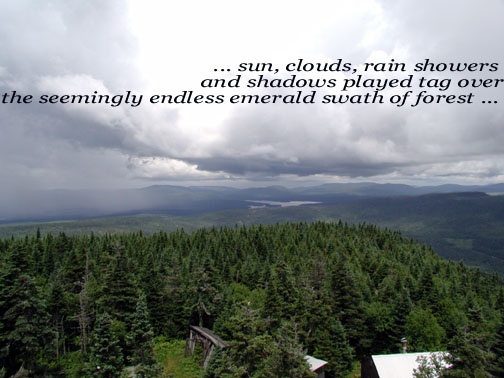|
Looking for a getaway vacation, the Merrimack couple went first to the Internet, where they discovered Pittsburg. Last Sunday
they drove nearly 200 miles north to this land that is as different as it is removed from the world they know.
From the top of the fire tower, the panorama of the Great North Woods spread out below them, changing constantly as the
sun, clouds, rain showers and shadows played tag over the seemingly endless emerald swath of forest.
The view encompasses just about all of the 171,000 acres owned by International Paper in Pittsburg, Clarksville and Stewartstown.
It is the largest, privately owned tract in the Granite State, and it is up for sale.
"This is just beautiful," Mahoney said, turning in a circle to see the 360-degree view.
What she could not see from the mountain are the people who earn their livelihoods within this forest and the concerns
they have about this sale and the effect it may have on a way of life, which, like the land, is unique and special.
***
To the north and west of the 3,360-foot Magalloway Mountain at noon last Monday, First Connecticut Lake was partly obscured
by a veil of rain. Looking north, Second Lake peeked from behind a mountain ridge and in the west beyond Diamond Ridge, over
in Maine, Azicohos Lake was a liquid ribbon on the horizon.
Three hours to the south in Concord, Gov. Jeanne Shaheen announced that the Trust for Public Lands will purchase the tract
from International Paper, sparing it from the open market and buying time for public and private organizations to come up
with a plan that will preserve it.
Details of her announcement were slow in coming here to the far north that afternoon where its more than likely a scan
of the radio dial will pull in French language radio stations and many folks make do without cable television.
The next day, U.S. Sen. Judd Gregg convened a meeting of assorted officials, including selectmen from the towns in which
International Paper owns property. They are grateful that Gregg moved quickly to secure $4 million in the Interior Appropriations
budget for easements on the paper companys land. But the meeting took place in Concord, raising the ire of some local officials,
who had to make a six-hour roundtrip to learn about the future of the land in their own back yard.
***
"I was at the town office today and surprised at how many people came by with questions about the meeting (Tuesday),"
Stewartstown selectman Connie Coviello said Wednesday. 'Their concerns are about what is going to happen we want it to continue
as it is, for all those things logging, tourists, recreation."
She was pleased that at the end of the meeting called by Gregg, a date was set for a local meeting about the International
Paper land.
"We are not Concord, we are not Manchester," she said. "These meetings should be held up here, where people
can come in and be assured they have a voice at the table. We want to preserve what we have, which is unique in the North
Country. My greatest concern is that if these meetings are not held in the North Country, things will go awry."
International Paper owns a total of 171,000 acres that reach down from the Canadian border into three towns. The largest
acreage, about 142,000 acres, is in Pittsburg, while Clarksville has 26,000 and Stewartstown has 3,000.
Pittsburg selectman Burnham Bing Judd said International Paper pays $115,000 in land taxes to the town and last year paid
$64,000 in timber taxes. In addition, it has about 130 leases, on which, over the years, a number of people have built camps
in some of the remotest parts of town, ranging from rustic to elaborate. Those leases are worth about $30,000.
Following Tuesday`s meeting, Judd said, "I came away feeling positive, but noted that sometimes, government doesn`t
always know what`s best for people or forests."
From the moment the announcement was made that International Paper would put its New Hampshire acreage up for sale, Judd
maintained that he doesn't care what happens to the land, as long as nothing changes.
***
The region has become a draw for recreation in a variety of forms snowmobiling, hunting, fishing but Pittsburg has roots
in the timber that has come off the land.
"Before IP, it was owned by Champion and before that, St. Regis had owned it since the 1920s or 30s," he said.
"Before that, it was owned by the Connecticut Valley Lumber Company and before that, the Indians had it."
If logging is curtailed by the next steward of the land, he said, it would cost the town "megabucks in the timber
tax" and a lot more for woodsmen.
"These people make payments on skidders and equipment," he said. "It`s scary. Im hoping and praying that
(after the public meeting) I'll come away feeling better."
***
Up until a year or so ago, Linda Glew and her husband lived in Epping. Then they bought the Sportsmans Lodge on Diamond
Pond in Stewartstown, where snowmobilers come in the winter and anglers, hunters and others come in the other seasons.
"People will come up here and say we need development," she said. "I'd like to see it stay this way. We
look out over the pond and its so quiet. You can see a few houses between the trees, but its just a nice place.``
What has struck her in the past year, since coming to the Great North Woods, is the inability of many people to unwind
when they get there.
"They don`t understand that they cant use their cell phones up here," she says with a laugh. "One of the
nice things about owning the lodge is that we haven`t once had to tell someone to turn off their cell phone."
She has adapted to not getting a daily newspaper on her doorstep or having cable television and those periodic power outages.
She knows that if she doesn't go into town one day, a neighbor who is going will run an errand or two.
Once a month or so, she and her husband will make a trip to Concord, armed with a long list, and get the things they need
for their business. There's a tenseness within her heading south, she explains, that doesn't relent until they're turned around
and heading north again.
***
Bert von Dorhmann was 6 years old when his family moved north to Pittsburg from Methuen, Mass., in the late 1950s. He
can remember playing outside in the winter and seeing very few cars drive by.
That's not the case now, as the northernmost town in the state draws thousands of people throughout the snowy season to
run their snowmobiles in the heart of International Paper land.
Come Thursday or Friday night in the winter, the headlights of cars towing snowmobiles look like a long string of pearls
glowing through the darkness that has usually settled in by the time they reach Pittsburg.
"Winter is our biggest business," said Paul Bergeron, who owns Ramblewood Lodge and is president of the Ridge
Runner Snowmobile Club. "We're booked right up for the next season and if we lose that, we won't be paying taxes."
Once one snowmobile season ends, there is no break, as planning begins immediately for the next one.
"We've created a beautiful trail system - there's 200 miles of them - and we do a good job of maintaining them,"
he said. "We have a good reputation and people are coming here from all over the Northeast to ride."
Fully 80 percent of the Ridge Runners trail system runs through International Paper Company land. Take that away, or close
off a portion of that and the results could be like knocking over the first domino.
"It's hard to estimate how many businesses would be affected," he mused. "We pay rooms and meals taxes,
we employ a work force, so there would be layoffs and unemployment."
In the middle of summer, he and other club officials are preparing for the next season, despite the uncertainty of the
future.
"So many people think this is state land, but this land is not state land," he said. "One of my major concerns
is, what if we lose tax revenue? The town couldn't survive."
|

